中考英语语法一点通课件——Lesson 16 反意疑问句、感叹句和祈使句
文档属性
| 名称 | 中考英语语法一点通课件——Lesson 16 反意疑问句、感叹句和祈使句 | 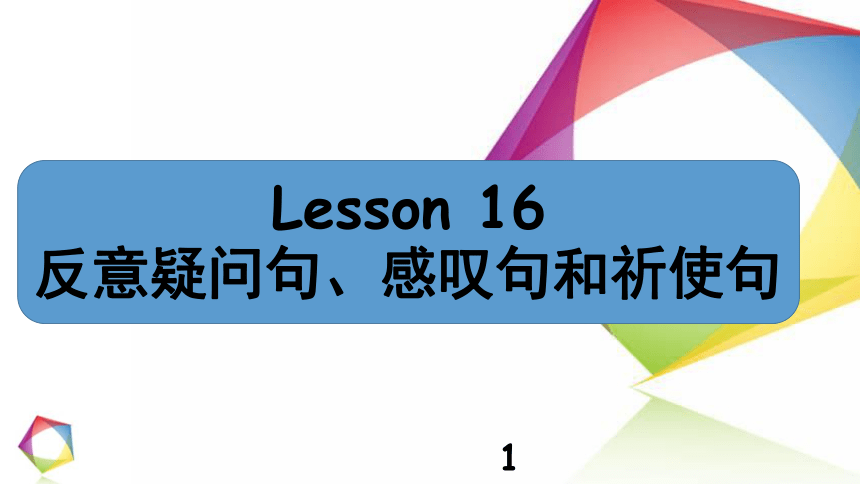 | |
| 格式 | pptx | ||
| 文件大小 | 1.0MB | ||
| 资源类型 | 试卷 | ||
| 版本资源 | 通用版 | ||
| 科目 | 英语 | ||
| 更新时间 | 2022-04-11 14:03:36 | ||
图片预览


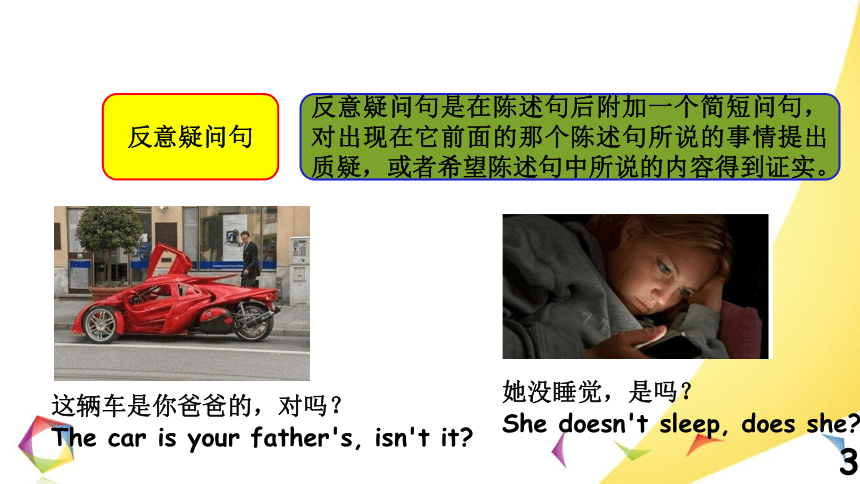
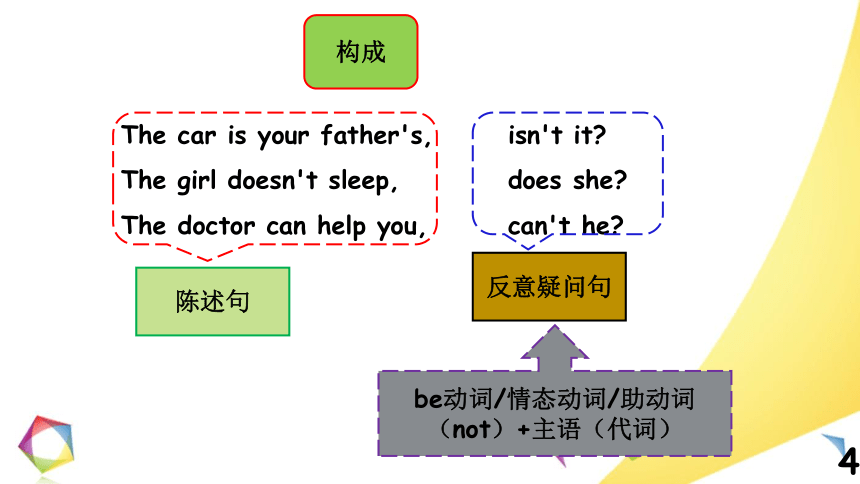
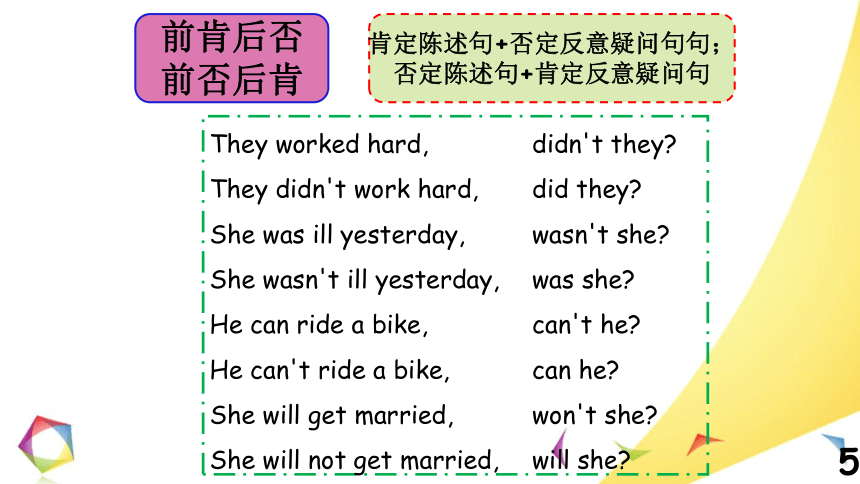
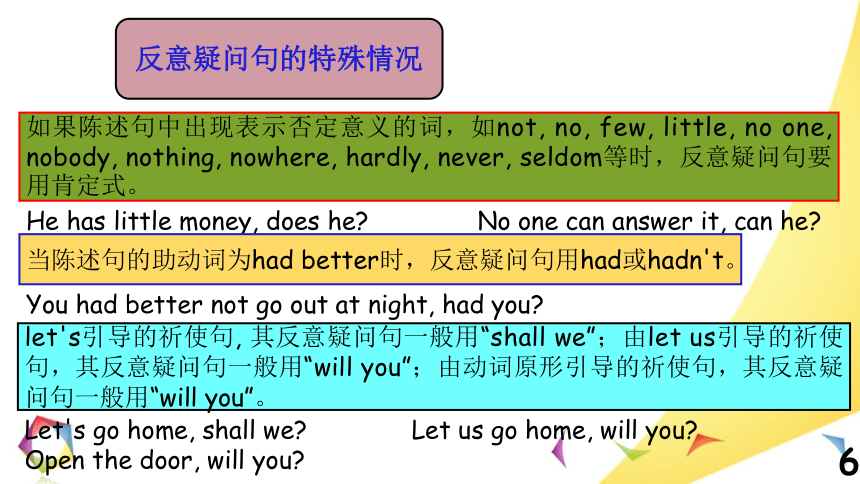
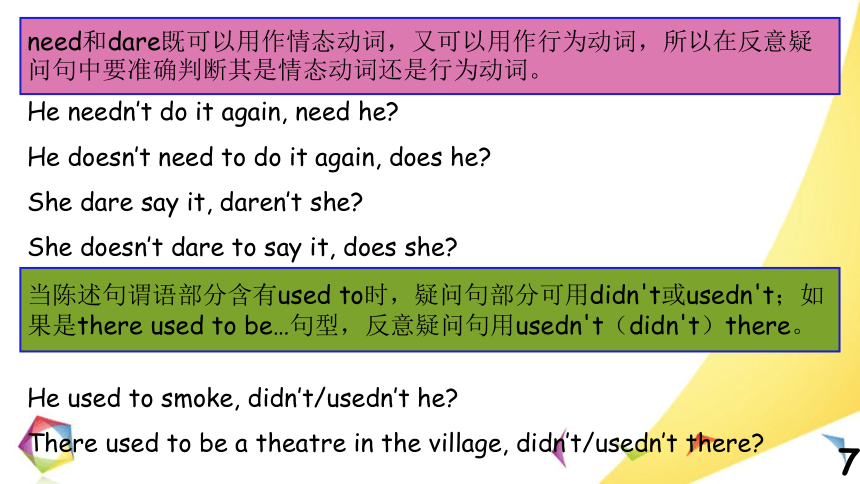
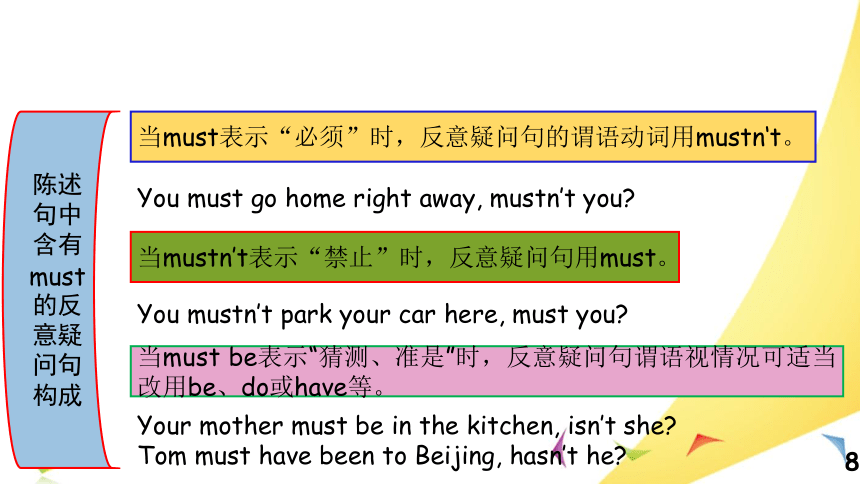
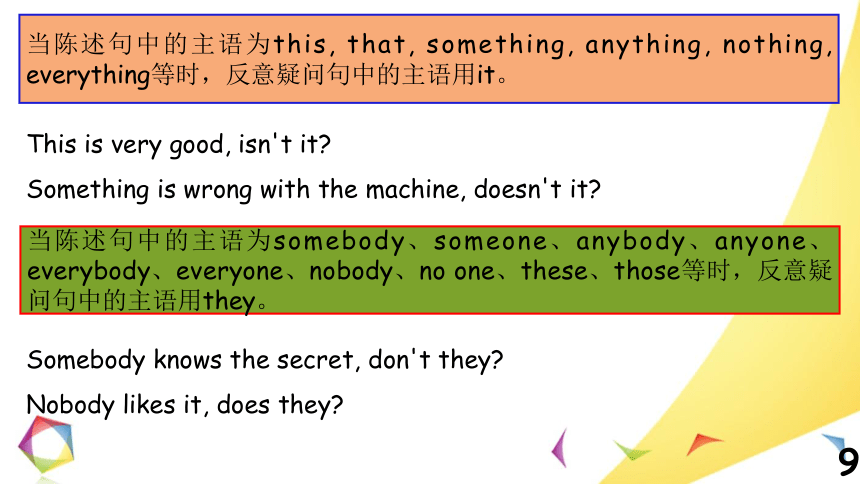
文档简介
(共25张PPT)
Lesson 16反意疑问句、感叹句和祈使句反意疑问句这辆车是你爸爸的,对吗?The car is your father's, isn't it 她没睡觉,是吗?She doesn't sleep, does she 反意疑问句反意疑问句是在陈述句后附加一个简短问句,对出现在它前面的那个陈述句所说的事情提出质疑,或者希望陈述句中所说的内容得到证实。构成The car is your father's, isn't it The girl doesn't sleep, does she The doctor can help you, can't he 陈述句反意疑问句be动词/情态动词/助动词(not)+主语(代词)前肯后否前否后肯肯定陈述句+否定反意疑问句句;否定陈述句+肯定反意疑问句They workedhard,didn't they Theydidn'twork hard,didthey She was ill yesterday,wasn't she She wasn't ill yesterday,was she He can ride a bike,can't he He can't ride a bike,can he She will get married,won't she She willnotget married,willshe 反意疑问句的特殊情况如果陈述句中出现表示否定意义的词,如not, no,few,little,no one,nobody,nothing,nowhere,hardly,never,seldom等时,反意疑问句要用肯定式。He has little money,doeshe No one can answer it, can he 当陈述句的助动词为had better时,反意疑问句用had或hadn't。You had better not go out at night, had you let's引导的祈使句, 其反意疑问句一般用“shall we”;由let us引导的祈使句,其反意疑问句一般用“will you”;由动词原形引导的祈使句,其反意疑问句一般用“will you”。Let's go home, shall we Let us go home, will you Open the door, will you need和dare既可以用作情态动词,又可以用作行为动词,所以在反意疑问句中要准确判断其是情态动词还是行为动词。He needn’t do it again, need he He doesn’t need to do it again, does he She dare say it, daren’t she She doesn’t dare to say it, does she 当陈述句谓语部分含有used to时,疑问句部分可用didn't或usedn't;如果是there used to be…句型,反意疑问句用usedn't(didn't)there。He used to smoke, didn’t/usedn’t he There used to be a theatre in the village, didn’t/usedn’t there 陈述句中含有must的反意疑问句构成当must表示“必须”时,反意疑问句的谓语动词用mustn‘t。You must gohome right away, mustn’t you 当mustn’t表示“禁止”时,反意疑问句用must。You mustn’t park your car here, must you 当must be表示“猜测、准是”时,反意疑问句谓语视情况可适当改用be、do或have等。Yourmothermust be in the kitchen,isn’tshe Tom must have been to Beijing, hasn’t he 当陈述句中的主语为this, that, something, anything, nothing, everything等时,反意疑问句中的主语用it。This is very good, isn't it Somethingis wrong with the machine, doesn't it 当陈述句中的主语为somebody、someone、anybody、anyone、everybody、everyone、nobody、no one、these、those等时,反意疑问句中的主语用they。Somebody knows the secret, don't they Nobody likes it, does they 如果陈述句的否定词带有否定前缀或否定后缀,反意疑问句要用否定式。She is unhappy, isn't she That is useless, isn't it 陈述句部分如果是并列句,附加部分根据第二个分句来变。I go out andyouwillstayat home, won't you Youmust study hard or you can't work well, can you 当陈述句部分含有主从复合句时,附加部分的代词和助动词须与主句中的主谓保持一致。You needn't do itsince he has finished it, need you It's the second time that you have sung that song, isn't it 含有宾语从句的主从复合句,若陈述句为“I/we+think、believe、suppose、expect、feel、imagine、figure等+宾语从句”,反意疑问句跟从句变,如果主句是否定句,反意疑问句要用肯定式;若主句主语不是第一人称,反意疑问句则根据主句来变。He thinks that it will rain tomorrow, doesn't he I think that it will rain tomorrow, won't it They don't suppose that the film is moving, do they 反意疑问句的回答对反意疑问句的回答,无论问题的提法如何,如果事实是肯定的,就用yes,事实是否定的,就要用no。要特别注意陈述句部分是否定结构,反意疑问句部分用肯定式提问时,回答yes或no与汉语正好相反。这种省略回答的yes要译成“不”,no要译成“是”。—He likes playing football, doesn't he —Yes, he does. / No, he doesn't.—His sister didn't attend the meeting, did she —Yes, she did. / No, she didn't.感叹句What引导感叹句Whata/an形容词单数可数名词主语(代词)+谓语What a tall man he is! What a beautiful flower it is!What形容词复数可数名词主语(代词)+谓语What tall men they are! What beautiful flowers they are!What形容词不可数名词主语(代词)+谓语What good weather it is! What great fun it is!What形容词不可数名词主语(代词)+谓语fun(乐趣)weather(天气)news(消息)food(食物)music(音乐)work(工作)advice(建议)information(信息)How引导感叹句How形容词主语(名词)+谓语How exciting the game is!How clever the boy is!How副词主语(名词)+谓语How hard the boy studies!How carefully she is drawing!What引导感叹句How引导感叹句What a tall man he is!What beautiful flowers they are!What good weather it is!How tall the man is!How beautiful the flowers are!How good the weather is!主语(代词)+谓语形容词How主语(名词)+谓语How主语(名词)+谓语形容词副词What不可数名词主语(代词)+谓语What形容词主语(代词)+谓语复数可数名词What形容词单数可数名词a/an选what还是how沙场大点兵1._______role she played in the movie! That’s why she has a lot of fans.A. How interesting B.How an interestingC.What interesting D.What an interesting2._____fun it is to play computer games when we’re free.A. What a B. What C. How a D. How3. _______nice the ice cream looks! I can't wait to taste it.A. How a B. How C. What a D. What祈使句Be careful.Close the door, please.Don't talk in class.祈使句表示请求、命令、劝告等的句子,主语省略了”you"。祈使句的构成肯定式Be+形容词/名词Be quiet!Be a good boy.Do+其它成分Stand up, please!Come in.否定式Don't be+形容词/名词Don't be nervous!Don't be afraid.Don't do+其它成分Don't pick flowers!Don't hurry up.动词原形沙场大点兵1. When the car crashed, your brother escaped being hurt, ______ A. didn't heB. did heC. did itD. didn't it2. Let's listen to the radio program that the teacher mentioned, ______ A. do we B. don't we C. shall we D. shan't we3. Something will have to be done about the air pollution, ______ A. won't it B. will it C. has it D. does it4. Your friend needs to come earlier, ______ A. does he B. doesn't he C. need he D. needn't he5. _______role she played in the movie! That’s why she has a lot of fans.A. How interesting B.How an interestingC.What interesting D.What an interesting6. Guan Dong saved an old lady out of the Yangtze River.great courage he showed!A. What a B. What C. How a D. How7._____fun it is to play computer games when we’re free.A. What a B. What C. How a D. How8.in the street because it is dangerous.A. Not play B. Don’t play C. Not to play D. Play not9. Lucy, _________ the man and you’ll find his house.A. follow B. following C. to follow D. follows10._______weather! I really enjoy it very much.A. How fine B. How fine aC. What a fine D. What fine
Lesson 16反意疑问句、感叹句和祈使句反意疑问句这辆车是你爸爸的,对吗?The car is your father's, isn't it 她没睡觉,是吗?She doesn't sleep, does she 反意疑问句反意疑问句是在陈述句后附加一个简短问句,对出现在它前面的那个陈述句所说的事情提出质疑,或者希望陈述句中所说的内容得到证实。构成The car is your father's, isn't it The girl doesn't sleep, does she The doctor can help you, can't he 陈述句反意疑问句be动词/情态动词/助动词(not)+主语(代词)前肯后否前否后肯肯定陈述句+否定反意疑问句句;否定陈述句+肯定反意疑问句They workedhard,didn't they Theydidn'twork hard,didthey She was ill yesterday,wasn't she She wasn't ill yesterday,was she He can ride a bike,can't he He can't ride a bike,can he She will get married,won't she She willnotget married,willshe 反意疑问句的特殊情况如果陈述句中出现表示否定意义的词,如not, no,few,little,no one,nobody,nothing,nowhere,hardly,never,seldom等时,反意疑问句要用肯定式。He has little money,doeshe No one can answer it, can he 当陈述句的助动词为had better时,反意疑问句用had或hadn't。You had better not go out at night, had you let's引导的祈使句, 其反意疑问句一般用“shall we”;由let us引导的祈使句,其反意疑问句一般用“will you”;由动词原形引导的祈使句,其反意疑问句一般用“will you”。Let's go home, shall we Let us go home, will you Open the door, will you need和dare既可以用作情态动词,又可以用作行为动词,所以在反意疑问句中要准确判断其是情态动词还是行为动词。He needn’t do it again, need he He doesn’t need to do it again, does he She dare say it, daren’t she She doesn’t dare to say it, does she 当陈述句谓语部分含有used to时,疑问句部分可用didn't或usedn't;如果是there used to be…句型,反意疑问句用usedn't(didn't)there。He used to smoke, didn’t/usedn’t he There used to be a theatre in the village, didn’t/usedn’t there 陈述句中含有must的反意疑问句构成当must表示“必须”时,反意疑问句的谓语动词用mustn‘t。You must gohome right away, mustn’t you 当mustn’t表示“禁止”时,反意疑问句用must。You mustn’t park your car here, must you 当must be表示“猜测、准是”时,反意疑问句谓语视情况可适当改用be、do或have等。Yourmothermust be in the kitchen,isn’tshe Tom must have been to Beijing, hasn’t he 当陈述句中的主语为this, that, something, anything, nothing, everything等时,反意疑问句中的主语用it。This is very good, isn't it Somethingis wrong with the machine, doesn't it 当陈述句中的主语为somebody、someone、anybody、anyone、everybody、everyone、nobody、no one、these、those等时,反意疑问句中的主语用they。Somebody knows the secret, don't they Nobody likes it, does they 如果陈述句的否定词带有否定前缀或否定后缀,反意疑问句要用否定式。She is unhappy, isn't she That is useless, isn't it 陈述句部分如果是并列句,附加部分根据第二个分句来变。I go out andyouwillstayat home, won't you Youmust study hard or you can't work well, can you 当陈述句部分含有主从复合句时,附加部分的代词和助动词须与主句中的主谓保持一致。You needn't do itsince he has finished it, need you It's the second time that you have sung that song, isn't it 含有宾语从句的主从复合句,若陈述句为“I/we+think、believe、suppose、expect、feel、imagine、figure等+宾语从句”,反意疑问句跟从句变,如果主句是否定句,反意疑问句要用肯定式;若主句主语不是第一人称,反意疑问句则根据主句来变。He thinks that it will rain tomorrow, doesn't he I think that it will rain tomorrow, won't it They don't suppose that the film is moving, do they 反意疑问句的回答对反意疑问句的回答,无论问题的提法如何,如果事实是肯定的,就用yes,事实是否定的,就要用no。要特别注意陈述句部分是否定结构,反意疑问句部分用肯定式提问时,回答yes或no与汉语正好相反。这种省略回答的yes要译成“不”,no要译成“是”。—He likes playing football, doesn't he —Yes, he does. / No, he doesn't.—His sister didn't attend the meeting, did she —Yes, she did. / No, she didn't.感叹句What引导感叹句Whata/an形容词单数可数名词主语(代词)+谓语What a tall man he is! What a beautiful flower it is!What形容词复数可数名词主语(代词)+谓语What tall men they are! What beautiful flowers they are!What形容词不可数名词主语(代词)+谓语What good weather it is! What great fun it is!What形容词不可数名词主语(代词)+谓语fun(乐趣)weather(天气)news(消息)food(食物)music(音乐)work(工作)advice(建议)information(信息)How引导感叹句How形容词主语(名词)+谓语How exciting the game is!How clever the boy is!How副词主语(名词)+谓语How hard the boy studies!How carefully she is drawing!What引导感叹句How引导感叹句What a tall man he is!What beautiful flowers they are!What good weather it is!How tall the man is!How beautiful the flowers are!How good the weather is!主语(代词)+谓语形容词How主语(名词)+谓语How主语(名词)+谓语形容词副词What不可数名词主语(代词)+谓语What形容词主语(代词)+谓语复数可数名词What形容词单数可数名词a/an选what还是how沙场大点兵1._______role she played in the movie! That’s why she has a lot of fans.A. How interesting B.How an interestingC.What interesting D.What an interesting2._____fun it is to play computer games when we’re free.A. What a B. What C. How a D. How3. _______nice the ice cream looks! I can't wait to taste it.A. How a B. How C. What a D. What祈使句Be careful.Close the door, please.Don't talk in class.祈使句表示请求、命令、劝告等的句子,主语省略了”you"。祈使句的构成肯定式Be+形容词/名词Be quiet!Be a good boy.Do+其它成分Stand up, please!Come in.否定式Don't be+形容词/名词Don't be nervous!Don't be afraid.Don't do+其它成分Don't pick flowers!Don't hurry up.动词原形沙场大点兵1. When the car crashed, your brother escaped being hurt, ______ A. didn't heB. did heC. did itD. didn't it2. Let's listen to the radio program that the teacher mentioned, ______ A. do we B. don't we C. shall we D. shan't we3. Something will have to be done about the air pollution, ______ A. won't it B. will it C. has it D. does it4. Your friend needs to come earlier, ______ A. does he B. doesn't he C. need he D. needn't he5. _______role she played in the movie! That’s why she has a lot of fans.A. How interesting B.How an interestingC.What interesting D.What an interesting6. Guan Dong saved an old lady out of the Yangtze River.great courage he showed!A. What a B. What C. How a D. How7._____fun it is to play computer games when we’re free.A. What a B. What C. How a D. How8.in the street because it is dangerous.A. Not play B. Don’t play C. Not to play D. Play not9. Lucy, _________ the man and you’ll find his house.A. follow B. following C. to follow D. follows10._______weather! I really enjoy it very much.A. How fine B. How fine aC. What a fine D. What fine
同课章节目录
- 词法
- 名词
- 动词和动词短语
- 动词语态
- 动词时态
- 助动词和情态动词
- 非谓语动词
- 冠词
- 代词
- 数词和量词
- 形容词副词及其比较等级
- 介词和介词短语
- 连词和感叹词
- 构词法
- 相似、相近词比较
- 句法
- 陈述句
- 一般疑问句和否定疑问句
- 特殊疑问句及选择疑问句
- 反意疑问句
- 存在句(There be句型)
- 宾语从句
- 定语从句
- 状语从句
- 主谓一致问题
- 简单句
- 并列句
- 复合句
- 主谓一致
- 主、表语从句
- 名词性从句
- 直接引语和间接引语
- 虚拟语气
- 感叹句
- 强调句
- 倒装句
- 祈使句
- 句子的成分
- 句子的分类
- 题型专区
- 单项选择部分
- 易错题
- 完形填空
- 阅读理解
- 词汇练习
- 听说训练
- 句型转换
- 补全对话
- 短文改错
- 翻译
- 书面表达
- 任务型阅读
- 语法填空
- 其他资料
